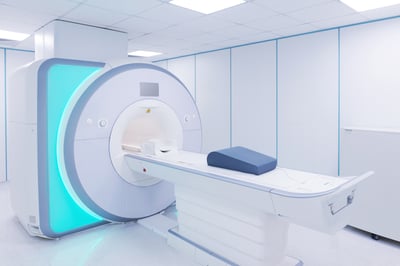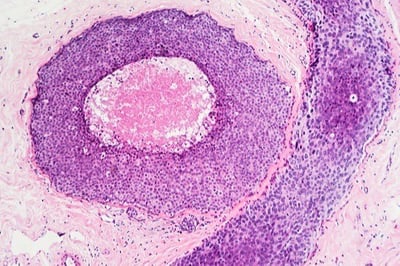FORCE's eXamining the Relevance of Articles for You (XRAY) program looks behind the headlines of cancer news to help you understand what the research means for you.
XRAY is a reliable source of hereditary cancer research-related news and information.
Learn more about the XRAY program
Categories Prevention, Screening
Update : Genetic causes of hereditary pancreatic cancer: BRCA and beyond
Most relevant for: People diagnosed with pancreatic cancer
An update on hereditary pancreatic cancer presented at the annual American Society of Clinical Oncology meeting covered genes and lifetime risk. The update emphasized that all pancreatic cancer patients should be offered genetic counseling and testing. Genetic test results may impact treatment, screening for other cancers and risk to family members. (11/26/19)
Read More
Relevance: Medium-Low


Research Timeline: Human Research


Personal Story : A “flu shot” against breast cancer? Not so fast
Relevance: Medium-Low


Research Timeline: Human Research


Most relevant for: Women diagnosed with Ductal Carcinoma In Situ (DCIS)
There have been multiple reports in the media of a Florida woman who had a "shot" to treat her DCIS with a promising outcome. This XRAY reviews the underlying story about this early breast cancer vaccine trial. (10/25/19)
Read More
Study : Does eating meat affect breast cancer risk?
Most relevant for: Women with a family history of breast cancer
Eating meat has been suggested to increase breast cancer risk. The recent Sister Study looked at meat type, cooking methods and breast cancer risk in a study of 42,012 women. (9/10/19)
Read More.jpg)
Relevance: High


Strength of Science: Medium-High


Research Timeline: Post Approval


Study : MRI or mammograms for detecting breast cancer in families with unknown genetic mutations?
Relevance: High


Strength of Science: Medium-High


Research Timeline: Post Approval


Most relevant for: People with a personal or family history of cancer where no mutation has been found
MRI and mammograms are used together to detect breast cancer in high-risk women who test positive for a BRCA or other gene mutation that increases the risk for breast cancer. For women with a family history of breast cancer but no known genetic mutation, increased screening is recommended. But what method is best? A recent clinical trial in the Netherlands compared MRI and mammography for this population. (8/15/19)
Read More
Relevance: Medium-High


Strength of Science: Medium-High


Study : Diagnosis and treatment delays in young women with breast cancer
Relevance: Medium-High


Strength of Science: Medium-High


Most relevant for: Young women who find a breast lump and young women newly-diagnosed with breast cancer
Young women are more likely to have delays in a breast cancer diagnosis and treatment. Factors that affect these delays include pregnancy, breastfeeding, financial concerns and having a family history of breast or ovarian cancer. (8/5/19)
Este artículo está disponible en español.
Read More
Guideline : FDA asks Allergan to recall certain textured breast implants
Most relevant for: Women with, or considering breast reconstruction with implants
On July 25, 2019, the Food and Drug Administration requested that breast implant manufacturer Allergan recall its BIOCELL textured implants and expanders due to an association with a rare type of lymphoma called Breast Implant Associated Anaplastic Large Cell Lymphoma or BIA-ALCL. The FDA does not recommend removing implants for people who do not have disease symptoms. This XRAYS review updates information about this FDA recall. (7/29/19)
Read More
Study : A low-fat diet may decrease postmenopausal breast cancer deaths
Most relevant for: Post-menopausal women with no breast cancer diagnosis
Research reported at the 2019 annual meeting of the American Society of Clinical Oncology establishes a link between dietary fat intake and its impact on postmenopausal women’s risk of dying from breast cancer. (6/13/19)
Read More
Relevance: Medium-High


Quality of Writing: Medium-High


Personal Story : A young woman's story of genetic testing and risk-reducing mastectomy
Relevance: Medium-High


Quality of Writing: Medium-High


Most relevant for: Young women of color with a BRCA mutation
Alejandra Campoverdi comes from a family with three generations of breast cancer. As a former White House aide and active educator in the Latina community, she has openly shared her story of genetic testing, her BRCA2 mutation and her plans for risk-reducing mastectomy at age 39. (6/6/19)
Este artículo está disponible en español.
Read More
Study : Do Vitamin B supplements alter breast cancer risk for women with BRCA mutations?
Most relevant for: High risk women with a BRCA1 or BRCA2 mutation
Vitamins are an essential part of our diet. Vitamin supplements are often used to improve general health. This study explores how vitamin B supplements may affect breast cancer risk in women with BRCA mutations. (5/17/19)
Read More
Relevance: Medium-High


Research Timeline: Post Approval


Guideline : Breast surgeons recommend genetic testing for all breast cancer patients
Relevance: Medium-High


Research Timeline: Post Approval


Most relevant for: Anyone diagnosed with breast cancer
The American Society of Breast Surgeons published statement on genetic testing for hereditary breast cancer on February 10, 2019. It includes recommendations about who should be tested. Among these is the recommendation that all breast cancer patients get genetic testing, as well as women who do not have breast cancer but fit the National Comprehensive Cancer Network (NCCN) guidelines. (3/25/19)
Read More